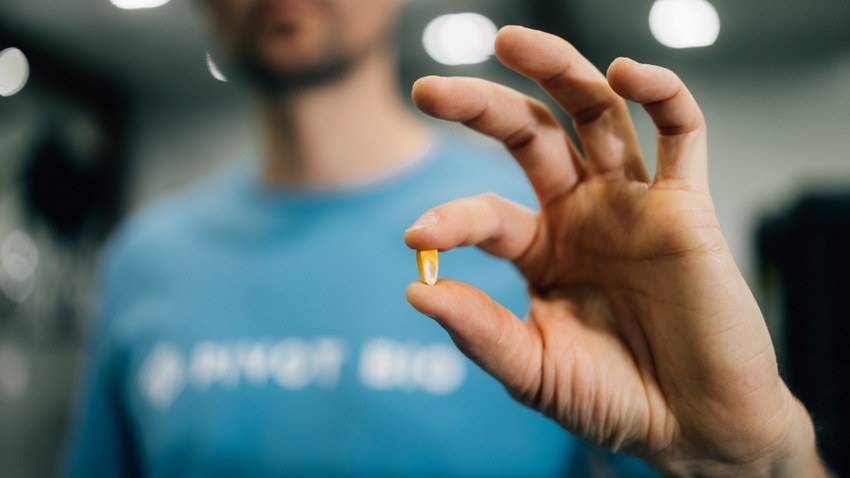
Dependable nitrogen, proven performance and promising climate solutions are just a few of the benefits Pivot Bio says it can bring to the agriculture industry.
CEO Chris Abbott and Karsten Temme, chief information officer and co-founder, share how the company can increase yield and crop performance while saving farmers money.
Pivot Bio products are a biological solution to dependable nitrogen for crops from corn to small grains. Utilizing biologicals, they harness the natural solution to deliver nitrogen to plants. Through genetic coding, these microbes allow producers to reduce the amount of synthetic nitrogen that is applied, they say.
“This process allows us to develop the next step of innovation that can fit into each type of farm to unlock the next set of productivity and efficiency,” Temme says. “Pairing these strategies together with existing nitrogen management can get us one step further.”
The two products available to farmers today include ProveN 40 and Return. They are available in on-seed and liquid options, with ProveN 40 for corn and corn silage, and Return for wheat, sorghum and other small grains.
The biggest benefit farmers can see, according to Temme and Abbott, is a reduction in synthetic nitrogen needed in fields using Pivot Bio products.
What’s the science and benefit?
“This microbe is genetically programmed with a very specific mode of action,” Abbott explains. The microbes and plants both benefit from a symbiotic relationship, where the microbes feed off of sugars from the plant and provide nitrogen to the plant.
Pivot Bio’s products are different from other biologicals, with the microbes in its products being manufactured by the company itself. Genomic edits are centered only on the nitrogen-fixation pathway, enabling certain microbes to convert nitrogen from the atmosphere and produce ammonia continuously.
“We’ve seen massive success on millions of acres, primarily in corn,” Abbott says. “The biggest thing that we continue to focus on is providing a product that fixes nitrogen biologically day in and day out.”
While synthetic nitrogen and other products saw a large price jump in recent years, Pivot Bio product prices have remained the same.
“We don’t suffer the risk of volatility from a synthetic price,” Temme explains. “We haven’t touched our price in the last three years. As we bring more of these solutions together, we can make farmers a better program that is less risky, while preforming for our customers over time as they think about crop nutrition.”
The discussion on which farms could or should reduce nitrogen while using this product can be complicated. “It’s our job to give farmers the data about how this product fixes nitrogen,” Abbott says. “We have to consider the weather, the volatility and all of the issues that can happen around synthetic nitrogen sources with these decisions.”
As with many factors in agriculture, that answer depends on the farm. “It can become complicated very quickly, especially when designing a fertilizer program for a customer. Our philosophy is to support them with the data alongside their independent agronomist,” Abbott says.
On-farm trials give best results for your farm
North Dakota State University Extension has tested Pivot Bio and other biological nitrogen products in corn trials. Its research, published in April, “Performance of Selected Commercially Available Asymbiotic N-fixing Products in the North Central Region,” focused on determining yield benefits alongside variable N fertilizer rates to determine possible product value to farmers.
The research included many other states in the north-central region, including Minnesota, Kansas, Nebraska, Ohio, Kentucky, Missouri and Illinois. The University of Illinois, University of Minnesota and University of Nebraska all conducted corn trials specifically using ProveN 40.
Results are summarized in the paper as follows:
N rate comparison. There were 12 trials that compared N rate with or without ProveN, with 11 trials resulting in no yield benefit to ProveN and one trial with a ProveN yield benefit over N rate alone. Thirteen trials were performed using ProveN in-furrow and two using ProveN 40 as a seed treatment. There were no benefits to ProveN 40 in either application method at any site.
Yield benefit. In total, over all products, there were 53 corn experiments on biological N-fixer products, with 51 trials finding no benefit to their use, and two experiments finding a yield benefit over the N treatment alone to which they were applied. The N rate benefit from those two studies finding yield improvement ranges from 12 to 20 pounds.
Individual testing. Farmers could speculate reasoning of performance from product as any number of causes, ranging from drought conditions to soil type. Dave Franzen, lead investigator in this research, says that wise growers need to test these products of interest on their own farms in order to determine best practices.
More mass. Research from University of Georgia found that corn grown with Pivot Bio ProveN 40 had more mass — with test bushels weighing as much as 3.2 pounds more than their untreated counterparts — as well as a consistent yield advantage.
Dan Poston, vice president of field research and development for Pivot Bio, shares some additional points to the research conducted in the NDSU Extension paper. “At many of the sites in the NDSU Extension article, the full effect of Pivot Bio’s microbial nitrogen cannot be measured in a yield difference, nor can the effect of synthetic nitrogen,” he says.
“Yield is not the only way to measure the efficacy of nitrogen, but it is the only metric discussed in this article,” he says, adding that factors such as biomass, growth rate, nitrogen captured in above or below ground tissue, and canopy closure should be considered.
“With microbially derived nitrogen, you can almost determine that the source of nitrogen in the plant came from fixation of atmospheric nitrogen,” he says. “None of these other metrics are discussed in the Extension article.” With these missing metrics, Poston says the data is misleading.
Find more on Poston’s response and alternate research on Pivot Bio products at Embracing Innovation.
Curiosity on new products is good for farm innovation, but testing through replicated on-farm research and searching for unbiased data should be considered before full use, according to NDSU. Read more about the NDSU research online.
Find more information about conducting your own on-farm research trials from University of Nebraska Extension, or from contacting your local Extension agent.
About the Author(s)
You May Also Like






